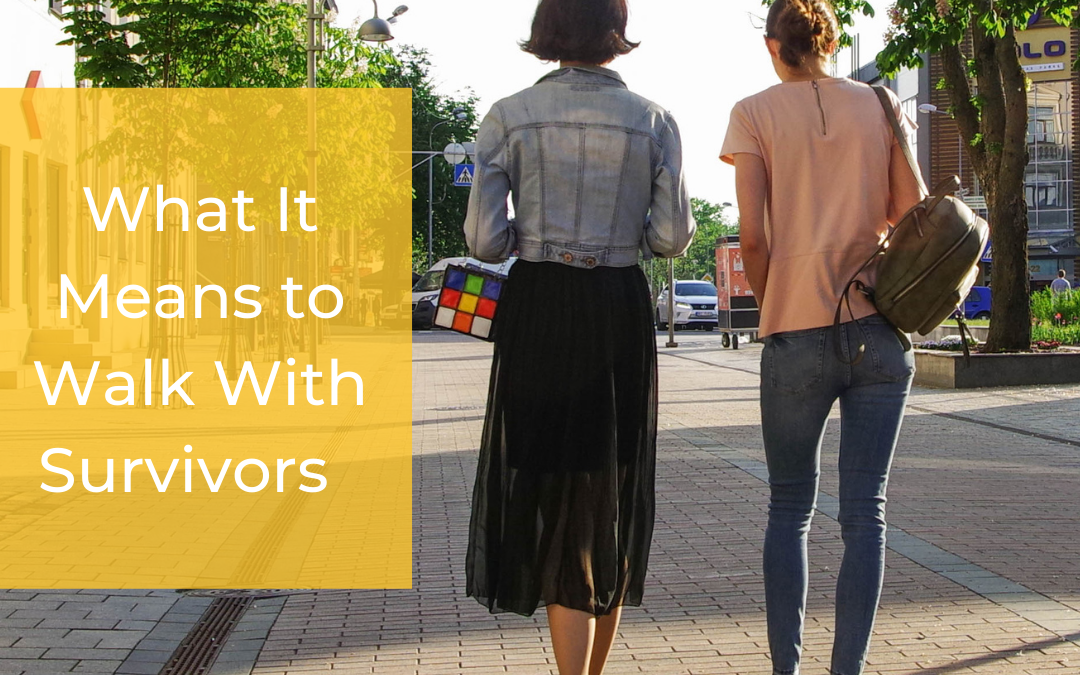If you volunteer, follow us on social media, or attend any of our trainings, you are likely to hear us talking about how we walk with survivors. While the idea of “walking with” someone is very common in Christian communities, we want to explain what this means for us at RAHAB—theoretically and practically.
To walk with someone basically means to stand by their side through everything. It is a long-term commitment to be a part of someone’s life. It is also very intentional. You don’t accidentally stumble into someone’s life and just happen to be there. It is a choice to be someone they can count on through every life event.
For us, walking with survivors means we commit to supporting them on their healing journeys through our continuum of care. Our interactions with them are never one-and-done if we can help it. Continue reading to learn how our staff and volunteers walk with survivors through our programming.
Outreach and Drop-In
Our Outreach program staff and volunteers meet women on the streets, in strip clubs, and in jail. While this could be a one-time meeting, our teams are super intentional about reconnecting with the women we meet. Not only do we give them the number to our Drop-Ins, we continue to go back to the places we meet them. Whether it is a street corner, a club, or a correctional facility, we are consistently showing up to build relationships with the women.
Once the women have the number of our Drop-In, they are welcome to visit us whenever we are open. In these spaces we provide hot family-style meals, new and gently used clothes, a place to do laundry and shower, and so much more. There is no limit to how often a woman can come and everything is free of charge.
The women at the Drop-In are given one rule: as soon as they walk through our door, they’re family. There is no expiration date for how long they can come to the Drop-In. No matter what they are going through, they are welcomed with open arms and warm smiles. Our staff and volunteers are truly dedicated to making those spaces feel inviting, like home. In this space strangers become family; our staff and volunteers become people the women we serve can count on for support and love, people they can trust with each and every detail, twist, and turn of life.
Task Force
If one of our friends is in need of more specific care, we can refer them to one of our other programs for case management and social services. Our Task Force provides emergency law-enforcement response accompanied by our Victim Advocates. These highly-trained advocates begin to build a relationship with a survivor as soon as they are connected, whether that is through a referral, an operation, or a hotline call. Victim Advocates offer case management, link survivors to resources, and help them find the next step to healing. Victim Advocates often meet survivors at extremely vulnerable moments in their lives. From that first moment they are already walking with them in difficult times.
Safe Housing
Our safe house embodies what it means to walk with survivors. The safe house naturally resembles a home environment for our residents. The staff and other residents become like family, living each good and bad day together. They encourage one another, heal together, and work towards a future of independence and freedom. We know firsthand living—and healing—together can be difficult, which means there are many vulnerable and challenging moments our residents and staff go through together.
Our transitional housing program, The Oaks, helps women get back on their feet and lead independent lives. Case managers work 1-1 with survivors through extensive case management for a minimum of a year. In this year, our case managers help participants set life goals, ensure stable income, secure safe housing, and get connected in their community. Having someone fully dedicated to seeing them through these life changes and challenges builds relationships of trust and deep vulnerability
Minor Programming
We also have resources for minors with our minor mentoring, Selah’s Place, and minor community-based programming, The Willows. Minor Mentoring pairs youth with an adult mentor that is dedicated to encouraging the mentee and being a safe, healthy adult they can lean on for friendship and support in all seasons of life. We emphasize to all volunteers in this program that our young friends often have abandonment wounds. Our volunteers’ commitment must be long-term, not just an obligation they fulfill for a period of time, then walk away. Our ultimate hope for our mentors and mentees is that they would form lifelong friendships.
The Willows offers long-term case management for families, both biological and foster, to support them as they heal and learn to care for trafficked youth. Our families take a huge step of courage, inviting our case managers into the most vulnerable details of their lives. It can be challenging to ask for help, so our case managers build a relationship built on authenticity and trust. Caregivers and youth alike know their case managers are for them. With our 24/7 Family Crisis Hotline, families can trust they will never be left to fight any battles alone.
Healing from complex trauma can be one of the hardest things a person goes through. At RAHAB we work to ensure none of the women and children we serve go through it alone. We are dedicated to walking with survivors along every step of their journey.

